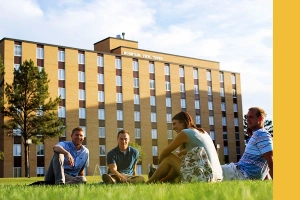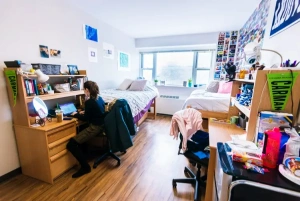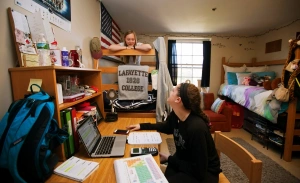Choosing your student housing options abroad is exciting. It’s not just a place to sleep; it’s your home base for exploring new experiences and forging lasting connections. To help you navigate the options and find the perfect fit, this guide is a breakdown of what you should know for international students.

Student Housing Options For International Students
Deciding on student housing as an international student can be exciting but overwhelming. To navigate the options and find your perfect home away from home, here’s a breakdown of popular choices:
On-campus housing:
- Pros: convenience (close to classes and amenities), built-in social scene, meal plans available, often affordable.
- Cons: Less privacy, shared spaces, and limited kitchen facilities (in dorms) may feel restrictive.
Related: Online International Education: Exploring Virtual Learning
Off-campus housing:
- Apartments: independent living, flexible cooking options, more space, and privacy.
- House sharing: sharing expenses and living space with other students; potential for cultural exchange.
- Homestay: Immerse yourself in local life, experience the family atmosphere, and receive cultural guidance.
Related: Global Citizenship Education: Fostering Inclusivity And Tolerance

Other options:
- Student co-ops: shared living space with self-governing structure; community focus.
- Private studios and rooms are Ideal for those seeking complete independence and privacy.
Related: Study Abroad Reflection: International Students’ Experiences
Considerations when choosing:
- Budget: Research average rent, utilities, and transportation costs.
- Location: proximity to campus, amenities, and public transportation.
- Safety: Research neighborhoods and security measures.
- Lifestyle preferences: shared spaces, privacy, amenities like laundry or gyms.
- Cultural fit: Consider your comfort level with different living arrangements and cultural dynamics.
Related: Staying Connected Using Technology
Remember:
- There’s no one-size-fits-all solution. Choose the option that best suits your needs and preferences.
- Be open to new experiences and embrace the cultural differences in student housing abroad.
- Don’t hesitate to ask for help from your university or other students.
Finding your home abroad is a crucial part of your study abroad experience. By carefully considering your options and choosing the right fit, you can set yourself up for success and create lasting memories in your new home.
Related: Language Immersion: Mastering a New Tongue

How To Find Housing For International Students
Finding housing in the UK as an international student can feel daunting, but with the right resources and steps, you can secure a comfortable and convenient place to call home. Here’s a roadmap to help you navigate the process:
Start Early:
Research and begin your search 3-6 months before your arrival date, especially for popular cities or peak school periods.
Related: Study Abroad Visa Interview: Navigating The Application Process
Explore your options:
- University accommodation: convenient location, built-in social scene, often affordable, but availability might be limited.
- Private student accommodation: more independence, choice, and amenities, but often pricier.
Related: Study Abroad Scholarships: Funding Your Global Educational Adventure
Popular options include:
- Studio apartments: self-contained units with a kitchenette and bathroom.
- Shared flats/houses: Share living space and expenses with other students.
- Homestays: Immerse yourself in local life and receive cultural guidance.
Related: Choosing The Perfect Destination: Where To Study Abroad
Utilize university resources:
- Accommodation office: Provides guidance, listings, and application support.
- International student societies: Connect with current students for recommendations and insider tips.
Related: Gap Year Adventures: Maximizing Learning Opportunities Abroad

Search online platforms:
- Global platforms: Student.com, Nestpick, Uniplaces – Offer vast listings and user-friendly interfaces.
- Regional platforms: Amber Student (Europe), SpareRoom (UK) – Cater to specific regions and offer local expertise.
- University accommodation portals: List available rooms and apartments managed by the university.
Related: Cultural Exchange: Embracing Diversity In Your Study Abroad
Be mindful of expenses:
- Research average rent, utilities, and council tax (local property tax).
- Factor in transportation costs when considering location.
- Set a budget and stick to it.
Related: STEM Study Abroad: Exploring Science And Technology Worldwide
Read contracts carefully.
- Understand lease terms, payment schedules, cancellation policies, and deposit requirements.
- Be aware of landlord and tenant rights in the UK.
Related: Internship Abroad: Gaining Practical Experience While Studying
Additional tips:
- Schedule virtual or in-person viewings, if possible.
- Ask questions about amenities, security, and neighborhood details.
- Consider signing up for guarantor services if required.
- Don’t hesitate to seek help from university staff or trusted sources.
Related: Scholarships For High School Seniors: Planning For Higher Education
Remember:
- Finding the ideal accommodation depends on your specific requirements and budget.
- Be open to new ideas and flexible in your search criteria.
- Trust your instincts and put safety and comfort first.
Finding a house in the UK is an exciting aspect of your study abroad experience. By being proactive, resourceful, and observant, you may confidently navigate the process and choose a welcoming environment for your academic path.
Related: Reverse Culture Shock After Study Abroad

Best App To Find Student Accommodation
Choosing the “best” app to find student accommodation depends on your specific needs and preferences. However, I can recommend some popular options with different strengths:
Global Platforms:
- Student.com: Vast global reach with over 1 million beds in 400+ cities, user-friendly interface, secure booking system, and various filters for narrowing down options.
- Nestpick: Focuses on verified student accommodation, offers virtual tours and detailed property descriptions, and allows for direct communication with landlords.
- Uniplaces: Offers a curated selection of student-friendly apartments and rooms, provides video tours and local recommendations, and includes cancellation protection.
Related: Healthcare Scholarships: Pursuing Medical And Nursing Fields
Regional Platforms:
- Amber Student (Europe): Large selection in European cities, offers flexible booking options and rental agreements, and focuses on student communities and events.
- Uhomes (Asia): Extensive listings in Asian countries, user-friendly interface with multiple languages, provides student discounts and relocation assistance.
- SpareRoom (UK): A popular platform for finding shared accommodation in the UK, offers direct communication with landlords, and allows for flexible move-in dates.
Related: Winning Scholarships For Community College Students

Additional factors to consider:
- Fees: Some platforms charge booking fees, while others are free.
- Reviews and ratings: Check user reviews and ratings of properties and platforms.
- Security features: Ensure the platform uses secure payment methods and data protection measures.
- Communication options: Choose a platform with convenient communication channels for contacting landlords.
Related: Education Loans Or Scholarships: Weighing Your Options
Remember:
- No single app is perfect, so explore and evaluate options based on your requirements and region.
- Before reserving any accommodation, make sure to read the reviews and ratings.
- Be wary of fraud and always use trustworthy platforms with safe payment methods.
- Do not be hesitant to contact landlords directly with queries and clarifications.
Related: Financial Aid For First-Generation College Students

Cheapest Place To Be As An International Student
Determining the absolute “cheapest” place to be as an international student involves a multitude of factors and depends heavily on your circumstances and priorities. However, I can offer some insights into countries and regions known for their affordability for international students, considering both living costs and tuition fees:
Related: Common Scholarship Application Mistakes To Avoid In 2024
Southeast Asia:
- Thailand: Popular for its bustling cities, delicious cuisine, and low cost of living. Tuition fees at public universities can be very affordable.
- Vietnam: Offers a vibrant culture, stunning landscapes, and a relatively low cost of living. Several universities offer English-taught programs at reasonable fees.
- Indonesia: A diverse country with unique cultural experiences, reasonable housing, and a rising international student community. Tuition rates vary by university and program.
Related: Student Insurance: A Wise Investment For College Life
East Europe:
- Poland: Provides a high-quality education at a fraction of the cost in Western Europe. Living costs are relatively inexpensive, and many universities offer English-taught programs.
- Romania offers stunning countryside, dynamic cities, and a relatively affordable cost of living. Tuition prices at public universities are reasonable, and numerous programs are taught in English.
- Hungary: Budapest is a well-known student city with a vibrant cultural scene. Living expenses are lower than in Western Europe, and English-language courses are accessible.
Related: Navigating Admission Tests For International Students

Latin America:
- Mexico provides a diversified geography, a rich culture, and a comparatively inexpensive cost of living. Tuition prices at public colleges are reasonable, and various English-language programs are offered.
- Argentina: Buenos Aires is a thriving metropolis with a sizable student population. Living expenses are lower than in Europe, and some colleges offer English-taught courses.
- Peru has affordable housing, spectacular historical monuments, and a burgeoning foreign student population. Public universities have low tuition, and certain programs are taught in English.
Related: Medical School Admission For Aspiring Doctors
Additional factors to consider:
- Currency exchange rates: Fluctuations can significantly impact your budget.
- Visa requirements and fees: Some countries have stricter visa requirements and higher fees for international students.
- Travel costs: Factor in the cost of flights and potential visa applications.
- Personal preferences: Consider your desired climate, cultural experiences, and language learning opportunities.
Related: Admission Process For Study Abroad Programs
Remember:
- Budget planning is critical. Before making a decision, research the cost of living, tuition, and other expenses.
- Scholarships and financial help can considerably lower your expenses.
- Consider working part-time to supplement your earnings while studying abroad.
The “cheapest” place may not be the greatest option for you. Select a location that is consistent with your academic ambitions, cultural interests, and overall well-being.
Related: Educational Institution Liability Insurance

Importance Of Choosing The Right Accommodation
Choosing the right accommodation, whether for everyday living, a holiday, or a study abroad experience, entails more than just choosing a place to stay. It can have a big impact on your overall well-being, comfort, and even success in many areas of your life. Here are some main reasons why choosing the proper housing is important:
Related: Admission Requirements For Online Degree Programs
- Comfort and Wellbeing:
- Physical comfort: The ideal accommodation should offer a safe, clean, and comfortable setting that matches your fundamental requirements. This includes climate control, access to services like laundry or a gym, and enough room.
- Mental and emotional health: You may notice a big difference in your productivity, stress levels, and mood depending on your living environment. Your general well-being can be enhanced by selecting a space that suits your tastes and individuality while also feeling calm.
- Useful insights
- Location: Especially for daily living or academics, convenience is essential. Think about how convenient it is to go to work and school, as well as convenient services like grocery stores and public transportation.
- Budget: To prevent financial strain, it’s important to find a space within your budget. Pay close attention to any additional expenses, such as internet or parking, as well as rent and utilities.
- Lifestyle: Do you require a quiet room to concentrate, a lively atmosphere for socializing, or a family-friendly setting? Choosing an accommodation that meets your lifestyle needs might make a significant impact.
Some other importance include:
- Personal and Professional Success:
- Study abroad: Selecting the appropriate home for a study abroad experience can help with academic performance by offering a pleasant and supportive atmosphere for learning and adjusting to a new culture.
- Career and business: For professionals and business owners, selecting the correct office or workspace can affect productivity, creativity, and even client relations.
- Cultural experiences:
- Immersion: Choosing an accommodation that allows you to interact with locals, whether it’s a homestay or a shared living space, can enrich your cultural experience and broaden your perspective.
- Sense of belonging: Finding a community within your housing can provide support, friendship, and a sense of belonging, especially in unfamiliar surroundings.
- Overall satisfaction and memories:
- Enjoying your time: The right accommodation can turn your living space into a haven where you can relax, recharge, and create happy memories.
- Positive lasting impressions: Whether for a short stay or a long-term experience, choosing a place that meets your needs and exceeds expectations can leave a positive lasting impression.
Related: International Student Insurance Options For Studying In The U.S

Creative Ideas For Cost-Sharing Or Earning Extra Income
Whether you’re looking to lighten the load on shared expenses or boost your income, there are plenty of creative ways to achieve your financial goals. Here are some ideas to get you started:
Related: Resources For Students With Disabilities: Special Education Admission
Cost-sharing:
- Shared living: Splitting rent, utilities, and groceries with roommates is a classic money-saver. Consider teaming up with friends, colleagues, or online platforms to find compatible roommates.
- Subscription sharing: pool resources for streaming services, gym memberships, food delivery services, or online tools like project management software.
- Carpooling: Organize shared rides to work, school, or errands with colleagues, neighbors, or fellow students. Bonus points for using fuel-efficient vehicles or public transportation.
- Meal planning and cooking together: Planning and preparing meals in groups can save money on groceries and reduce food waste. Plus, it’s a great way to socialize and learn new recipes.
- DIY swaps and skillshares: Instead of buying new items, organize clothing swaps, furniture exchanges, or skill-sharing sessions where you can learn new things and trade services.
Related: 5 Insurance Tips For Parents Of College Students
Earning extra income:
- Online gigs and freelancing: Make use of your abilities to secure freelance jobs in data entry, virtual help, graphic design, writing, editing, and virtual assistant services. Numerous networks link clients and independent contractors.
- Gig economy jobs: To make money anytime you have spare time, sign up for task-based platforms, ridesharing services, or delivery applications.
- Sell any unwanted goods: Sell any items you no longer need, such as electronics, furniture, clothes, or garage sales or consignment stores, to clear out your space.
- If you enjoy animals, offer pet-sitting or dog-walking services in your community.
- Tutoring or childcare: Share your knowledge by tutoring students or providing babysitting services for families.
- Renting out a spare room or unused space: If you have an extra room or unused space, think about renting it out on sites like Airbnb or through local ads.
Related: Educational Travel Insurance For Students
Bonus ideas
- Attend focus groups or compensated internet surveys.
- For money, test apps and websites.
- Participate in medical research projects or receive compensation for donating plasma.
- Plan charity events or neighborhood gatherings.
- Launch a YouTube channel or blog to make money through sponsorships and advertising.
Your talents, interests, free time, and location will all determine the best course of action. Don’t be scared to venture beyond your comfort zone; be imaginative and open to new possibilities.
Related: How To Ace Your Exams: 24 Effective Study Strategies
Conclusion
The key to finding your ideal student housing is self-awareness and careful consideration. Prioritize your budget, location, and desired lifestyle, then explore the diverse options available. Embrace the cultural nuances and unique experiences each type of accommodation offers, and don’t be afraid to step outside your comfort zone.

